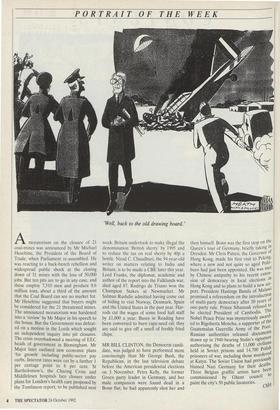PORTRAIT OF THE WEEK
'Well, back to the old drawing board.'
moratorium on the closure of 21 coal-mines was announced by Mr Michael Heseltine, the President of the Board of Trade, when Parliament re-assembled. He was reacting to a back-bench rebellion and widespread public shock at the closing down of 31 mines with the loss of 30,000 jobs. But ten pits are to go in any case, and these employ 7,310 men and produce 8.6 million tons, about a third of the amount that the Coal Board can see no market for. Mr Heseltine suggested that buyers might be considered for the 21 threatened mines. The announced moratorium was hardened into a 'review' by Mr Major in his speech to the house. But the Government was defeat- ed on a motion in the Lords which sought an independent inquiry into pit closures. The crisis overshadowed a meeting of EEC heads of government in Birmingham. Mr Major later outlined new economic plans 'for growth' including public-sector pay curbs. Interest rates were cut by a further 1 per centage point to 8 per cent. St Bartholomew's, the Charing Cross and Middlelesex hospitals face closure under plans for London's health care proposed by the Tomlinson report, to be published next week. Britain undertook to make illegal the denomination 'British sherry' by 1995 and to reduce the tax on real sherry by 40p a bottle. Nirad C. Chaudhuri, the 94-year-old writer on matters relating to India and Britain, is to be made a CBE later this year. Lord Franks, the diplomat, academic and author of the report into the Falklands war, died aged 87. Rodrigo de Triano won the Champion Stakes at Newmarket. Mr Salman Rushdie admitted having come out of hiding to visit Norway, Denmark, Spain and the United States in the past year. Har- rods cut the wages of some food hall staff by £1,000 a year. Buses in Reading have been converted to burn rape-seed oil; they are said to give off a smell of freshly fried chips.
MR BILL CLINTON, the Democrat candi- date, was judged to have performed more convincingly than Mr George Bush, the Republican, in the last television debate before the American presidential elections on 3 November. Petra Kelly, the former Green party leader in Germany, and her male companion were found dead in a Bonn flat; he had apparently shot her and
then himself. Bonn was the first stop on the Queen's tour of Germany, briefly taking in Dresden. Mr Chris Patten, the Governor of Hong Kong, made his first visit to Peking, where a new and not quite so aged Polit- buro had just been appointed. He was met by Chinese antipathy to his recent exten- sion of democracy in local elections r Hong Kong and to plans to build a new air: port. President Hastings Banda of Malawi promised a referendum on the introduction of multi-party democracy after 30 years of one-party rule. Prince Sihanouk refused to be elected President of Cambodia. The Nobel Peace Prize was mysteriously award- ed to Rigoberta Menchu, a supporter of the Guatemalan Guerrilla Army of the Poor. Russian authorities released documents drawn up in 1940 bearing Stalin's signature authorising the deaths of 11,000 civilians held in Soviet prisons and 14,700 Polish prisoners of war, including those murdered at Katyn. The Soviet Union had previously blamed Nazi Germany for their deaths.
Three Belgian graffiti artists have been to commissioned by Ghent council paint the city's 50 public lavatories.
csH


































































 Previous page
Previous page